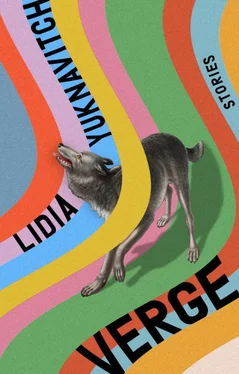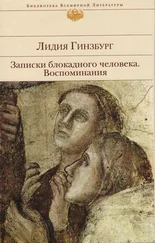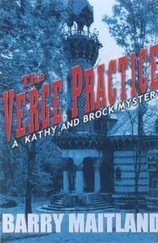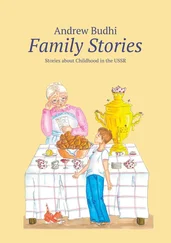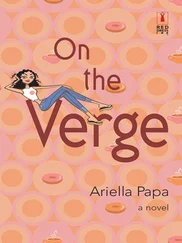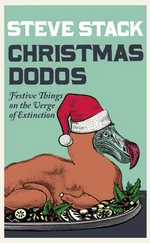Лидия Юкнавич - Verge - Stories
Здесь есть возможность читать онлайн «Лидия Юкнавич - Verge - Stories» весь текст электронной книги совершенно бесплатно (целиком полную версию без сокращений). В некоторых случаях можно слушать аудио, скачать через торрент в формате fb2 и присутствует краткое содержание. Город: New York, Год выпуска: 2020, ISBN: 2020, Издательство: Riverhead Books, Жанр: Современная проза, на английском языке. Описание произведения, (предисловие) а так же отзывы посетителей доступны на портале библиотеки ЛибКат.
- Название:Verge: Stories
- Автор:
- Издательство:Riverhead Books
- Жанр:
- Год:2020
- Город:New York
- ISBN:978-0-52553-487-7
- Рейтинг книги:4 / 5. Голосов: 1
-
Избранное:Добавить в избранное
- Отзывы:
-
Ваша оценка:
- 80
- 1
- 2
- 3
- 4
- 5
Verge: Stories: краткое содержание, описание и аннотация
Предлагаем к чтению аннотацию, описание, краткое содержание или предисловие (зависит от того, что написал сам автор книги «Verge: Stories»). Если вы не нашли необходимую информацию о книге — напишите в комментариях, мы постараемся отыскать её.
A fiercely empathetic group portrait of the marginalized and outcast in moments of crisis, from one of the most galvanizing voices in American fiction. cite
Verge: Stories — читать онлайн бесплатно полную книгу (весь текст) целиком
Ниже представлен текст книги, разбитый по страницам. Система сохранения места последней прочитанной страницы, позволяет с удобством читать онлайн бесплатно книгу «Verge: Stories», без необходимости каждый раз заново искать на чём Вы остановились. Поставьте закладку, и сможете в любой момент перейти на страницу, на которой закончили чтение.
Интервал:
Закладка:
Kiril’s favorite game was to snatch and hide Goodall, the stuffed monkey. Over time Anastasia grew expert at finding the object quickly by imagining a question: What would a boy whose boyhood has been taken from him do with a beloved object, having never been beloved himself? His hiding places were obvious, sometimes even a bit sad.
But one day something quite different happened to Goodall. As Anastasia was hunting for him, peering under a woodshed outside the house, Kiril came around the corner holding Goodall’s arm in the air above Anastasia’s head. She lunged for the stuffed monkey but missed. Kiril laughed, and the laugh made a sound something like a child moving toward manhood. Then Kiril brought out a giant pair of metal scissors—the kind that metalsmiths used—and clipped Goodall at the wrist. As he stood there holding Goodall’s hand aloft, Kiril’s smile curled like a worm. Anastasia’s breath stuck in her throat. She ran to retrieve the handless Goodall from the mud.
Kiril held the severed hand out to Anastasia.
“You can sew it to its foot if you like.”
She lunged for the hand a second time.
Kiril put it in his mouth and swallowed it.
In her head, Anastasia repeated the names of the cosmonaut monkeys: Abrek, Bion, Verny and Gordy, Dryoma and Yerosha, Zhakonya and Zabiyaka, Krosh and Ivasha, Lapik and Multik. Then, in her head and heart, she vowed to kill Kiril.
The thought came easily to her. A transaction, no more.
Had she been able to retrieve the monkey’s hand, she thought later, she would have sewn it to the monkey’s ankle for a while before putting it back where it belonged. Proof that anything could be taken apart and put back together. Instead, she simply sutured closed the monkey’s arm at the wrist.
ON HIS FIFTEENTH BIRTHDAY, Kiril was thrown something like a party. Poverty and wealth take different shapes in a home. Children who grow up without the support of family or security can become slippery, uncertain, feral. And yet, compared to abuse or neglect or relegation to an orphanage, their life might qualify as happy.
When Kiril blew out the candles on his cake, he stood up to give a small speech. Lifting up his shirt and pulling his waistband down just a bit, he told the others of his kidney operation, delicately fingering the stitches (which looked to Anastasia like a reddish, fascinating zipper) stretching from near his belly button up toward the side of his rib cage. Then he pointed to the new icebox his kidney had paid for. The aunt smiled. The other children clapped.
Very small pieces of cake that didn’t taste like much were cut—enough to feed all seventeen of them, plus Anastasia and the aunt and some man Anastasia didn’t know. Then all the children wanted to see inside the new icebox, where frozen meats and breads and vegetables and cheese were stacked like blocks of colored ice. The icebox would change their lives. To be able to store food was to live differently. Anastasia thought briefly of Kiril’s red zipper scar, imagined reaching in and grabbing some other organ from inside him as if she were reaching in for food.
A different child, a boy of eight or so—his name might have been Yegor or maybe Iilya; Anastasia sometimes got them mixed up—then smiled and threw his hands in the air, yelling, “These hands! These hands!” Because he’d been the organ runner. For Kiril’s kidney. Anastasia stared at his hands in the air, her own deadened hand hanging down by her side.
The organ runner’s story always mesmerized the other children. The doctor ( Was he a doctor? ) had placed the bloody bulb of Kiril’s kidney into the organ runner’s rubber-gloved hands, and then the organ runner placed Kiril’s kidney into a picnic cooler filled with precious ice, and then the child ran and ran between houses through alleys through breaks in fencing around trash in the night to an apartment about twenty-seven minutes away (they’d timed the run again and again) and up the apartment stairs three flights and into a dark room where a woman in her sixties from Florida was lying anesthetized on a table, with another doctor ( Was he a doctor? ) standing by, both of them waiting for the delivery. And why child runners are best is their small size their nimbleness running through alleys and slums and refuse and detritus their not being stopped for questioning their looking like street urchins crawling the nightscape exactly as they should look. And children asking nothing just running away.
There were other stories the children told, gathered on cold nights next to the fire. When one of them asked, another would lift a loose floorboard and pull out an old article from the United States—unfolding it carefully, as if it were something to be treasured—and read aloud. They memorized individual phrases about a faraway person named Kendrick: “Died in a tragic incident at a local school.” “Smothered under a floor mat.” “Body unearthed.” “His organs removed from his body, the cavities filled with newspaper.”
Children’s lives all over the world are shaped by such tales, told or lived by adults who transgress every principle of human value. Do not get kidnapped or snatched or abandoned, they learn. Everywhere, eyes might be watching you. Your bodies are worth their weight in gold.
Kiril’s ire, and Anastasia’s hatred, hit a zenith on the night of Anastasia’s first run. She’d done the route with a handler a dozen times, always in twenty-one minutes door-to-door with an eight-minute car ride between. Once, when the driver was late at the pickup point— twenty-three minutes twenty-five minutes thirty-two minutes —she stood in an alley trying to look like stones in the wall, shifting her weight from foot to foot, and at forty-four minutes she opened the picnic cooler filled with ice and a kidney and slipped her lame hand into a blue surgical glove from her pocket, jammed it down into the ice, and started massaging the kidney. She didn’t know why she did it. She just felt that the kidney needed help. Since she had so little feeling in her hand, Anastasia was able to keep her hand in the ice all the way to their destination, even as the driver looked over the backseat saying, Your hand, your hand, isn’t that cold? Can you feel your hand? Anastasia just sat there, singing quietly to the small kidney, until they reached the apartment and the driver told the doctor ( Was he a doctor? ) and the husband of the recipient—a Jewish woman from New York City whose name could not be moved any higher on the transplant list due to her age—what the girl had done.
And the husband of the woman from New York sat in a chair and cried, because he knew how important the hands of children could be.
AFTER THAT the story of Anastasia massaging the kidney on its journey took on a kind of magic. People started asking for the girl who had such sacred luck with human organs. Kiril repeated the story of his kidney removal, showing off his scar, but the scar was not as interesting as it once was, and it was forgotten in favor of the story of the girl who lovingly delivered organs to grateful recipients. All over the Ukraine and Russia, people began asking for the girl organ runner as a form of good luck. A bit of hope in the dark.
The aunt and the household prospered.
Kiril left rat shit and dog droppings in Anastasia’s hole in the stone wall.
Anastasia dreamed of Kiril’s death and dismemberment.
ONE SECTION of the Jane Goodall book that imprinted on Anastasia’s brain involved her time as a secretary in a physiotherapist’s clinic. The patients there were all afflicted differently. There were babies with clubfeet, children with polio whose limbs were limp and paralyzed, teens withering away toward death from muscular dystrophy or cerebral palsy. Many of the children could not walk and would have to spend the rest of their lives in wheelchairs, or leg irons, or clumsy crutches. And then there were the children whose diseases didn’t have a name yet, who could not seem to control their muscles at all, whose arms and legs were at war with themselves. Those children were often labeled crazy and sent to mental institutions. The doctor who treated the patients shared with Jane a surprising story: Once he had told a rather adult joke to a roomful of child patients at the clinic. As soon as he delivered the punch line, one patient’s eyes lit up with joy: the girl with the so-called crazy eyes. She was the only person in the room who’d understood the joke. The doctor took the girl home with him and gave her private lessons. The girl turned out to be quite brilliant, learned to talk, and passed every one of her school exams.
Читать дальшеИнтервал:
Закладка:
Похожие книги на «Verge: Stories»
Представляем Вашему вниманию похожие книги на «Verge: Stories» списком для выбора. Мы отобрали схожую по названию и смыслу литературу в надежде предоставить читателям больше вариантов отыскать новые, интересные, ещё непрочитанные произведения.
Обсуждение, отзывы о книге «Verge: Stories» и просто собственные мнения читателей. Оставьте ваши комментарии, напишите, что Вы думаете о произведении, его смысле или главных героях. Укажите что конкретно понравилось, а что нет, и почему Вы так считаете.
